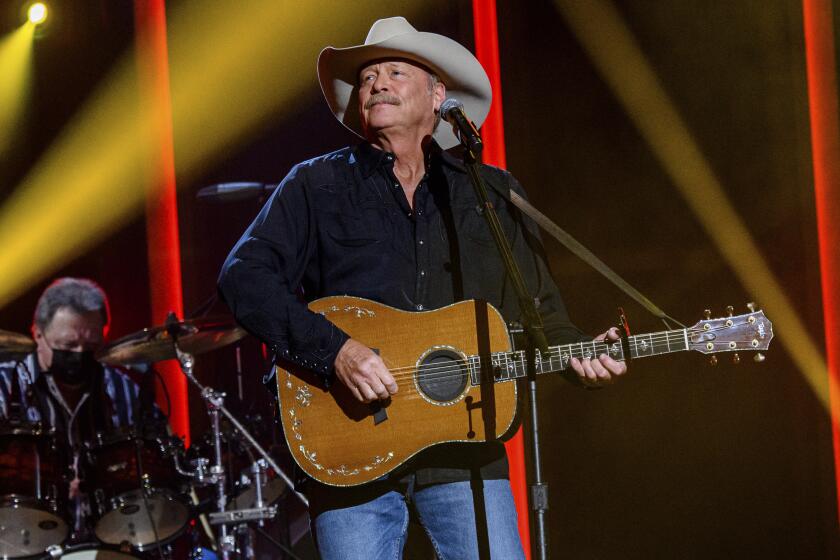Spinning oldies that don’t sound moldy
- Share via
Watergate and the Vietnam War were making the country feel nostalgic, yearning for less weighty times and tunes from the ‘50s and ‘60s. The social environment would make “American Graffiti” an unexpected box office hit the following year, but in 1972 a new station debuted in Los Angeles playing what it called “oldies” music: K-Earth 101.
KRTH-FM (101.1) had been simulcasting its far more popular sister station, KHJ-AM (980), which was spinning the latest hits, such as “Lean on Me” by Bill Withers and “Let’s Stay Together” by Al Green.
For the record:
12:00 a.m. Dec. 11, 2002 For The Record
Los Angeles Times Wednesday December 11, 2002 Home Edition Main News Part A Page 2 ..CF: Y 19 inches; 691 words Type of Material: Correction
Radio station -- A article about KRTH-FM in Friday’s Calendar mistakenly said the old pop station KHJ-AM was at frequency 980 on the dial. It was at 930.
Of course, now those are oldies too, getting heavy airplay on K-Earth. But that doesn’t mean songs of a certain age automatically join the playlist, like a musical membership in AARP. As a current station commercial says, “Obviously they’re not making any new oldies. Otherwise you might hear something like this,” followed by the cacophony of a punk song.
KRTH program director Jay Coffey said the cutoff seems to be 1979. Anything after that, listeners lump in the genre of ‘80s music -- they don’t want to admit, he said, that the songs they listened to in high school could be oldies. This even though -- let’s face it -- U2 and the Police appeared more than 20 years ago and are now older acts than the Supremes and Beach Boys were when K-Earth was launched.
So could Men at Work and A Flock of Seagulls ever play alongside the Temptations and the Four Tops?
“I don’t know if ‘80s music is going to have the same legs as ‘50s or ‘60s music,” Coffey said. He said the station did try playing the Police and some other contemporary acts a few years ago. “No matter how hard we tried to mix it and make it work,” he said, “people said they don’t belong on an oldies station.”
But even some older bands, and certain songs by KRTH regulars, can’t get on its airwaves because of the format’s parameters.
“There’s a big break between oldies and classic rock,” KRTH general manager Pat Duffy said. “Aerosmith is an oldies act now, but we can’t play them.” They can play the Rolling Stones’ “Satisfaction,” for example, but “Tumblin’ Dice” “wouldn’t fit us,” he said.
Critics have griped about the station’s repetitive playlist, saying that it doesn’t fully mine the reservoir of great songs available from the ‘50s, ‘60s and ‘70s. But management makes no apologies about using only a few of the best nuggets.
“This is a hit format,” Duffy said. “When people tune into an oldies station, they don’t want to hear the B-sides.”
In Los Angeles, where stations fight over tenths of a percentage of audience share, and where listeners flip the dial without hesitation, Coffey said K-Earth wants to make sure that listeners hear their favorite songs when they land on 101, and stick around. “Everybody has five different radio stations, and you have to be really selective what you put on the air, or you’re going to lose people,” Coffey said.
“If I don’t turn my hits around really fast, they’re not going to hear the songs they want to hear,” he said. “I have to really pay attention to mass appeal.”
That’s why the station assiduously tests songs twice a year on hundreds of listeners, to make sure the audience is getting exactly what it wants.
The station plays a 10-second hook and asks survey participants to rate the record. An approval rating of even 55% is about as low as the station can go, Coffey said. “That means you’re losing 45% of your audience.”
But the research has given the station its catalog of 700 songs and highlighted which ones listeners never seem to tire of. “We’ve found the records that are the classics -- ‘Unchained Melody,’ ‘My Girl.’ ”
“You have to make old songs sound fun and refreshing. We look at them as if they’re brand-new records and play them that way,” Coffey said. “Don’t make it sound as if it’s an old person’s station.”
Yet not every former hit stands the test of time. Bobby Sherman was a teen idol; Coffey said his songs now rate about 22% approval. Aretha Franklin’s “Natural Woman” gets regular spins, while Helen Reddy’s “I Am Woman” does not. “Hound Dog” By Elvis Presley -- yes. “Puppy Love” by Donny Osmond -- no.
“If you played all the music from 1972 or 1967, you wouldn’t have a station people would listen to,” Duffy said.
But even an oldies station can evolve, and K-Earth has gone through several changes in the past three decades. In the late ‘70s and early ‘80s, the station mixed in some current music with the oldies, Coffey said. It was automated and DJ-free for a time, until 1984. And in the early 1990s it tried to broaden its music mix, but ratings fell with the arrival of the new selections, he said. “Everything from the Carpenters to Foreigner. We pared it down, got rid of the music that really didn’t fit,” he said -- including the Carpenters and Foreigner.
K-Earth debuted sometime in October 1972, although Coffey said no one seems to have bothered marking the exact date.
“It wasn’t a momentous thing, because KHJ was so huge in ‘72,” he said.
But Duffy said the station isn’t that interested in making a fuss about the anniversary, anyway. He said some listeners don’t want to be reminded that their favorite songs are 30 years old or older, and the station’s focus is on sounding current.
“We don’t dwell on the past,” talking about “this date in history,” or draft dodging or Vietnam, Duffy said. “We don’t go there.”
He called the station a safe harbor, where parents can listen with their children and know the morning show won’t use bawdy humor, for instance.
Coffey described K-Earth as a “release valve.” “We stay away from Iraq and we stay away from terrorism. People come here to have a good time. We’re entertainers, not news people.”
Once again, the love songs and upbeat ditties of the 1950s and ‘60s are distracting listeners from war and domestic strife. K-Earth’s playlist and presentation make it a cheerful spot on the dial -- even people who don’t care for the music don’t dislike the station, Duffy claims. And they all know the station, or at least one tune from it: its insidious, memorable jingle -- the Johnny Mann singers’ improbably upbeat “K-Earth-1-0-1!”
“If you tell people you work at K-Earth,” Duffy said, “they’ll sing the jingle back to you.”
More to Read
The biggest entertainment stories
Get our big stories about Hollywood, film, television, music, arts, culture and more right in your inbox as soon as they publish.
You may occasionally receive promotional content from the Los Angeles Times.










